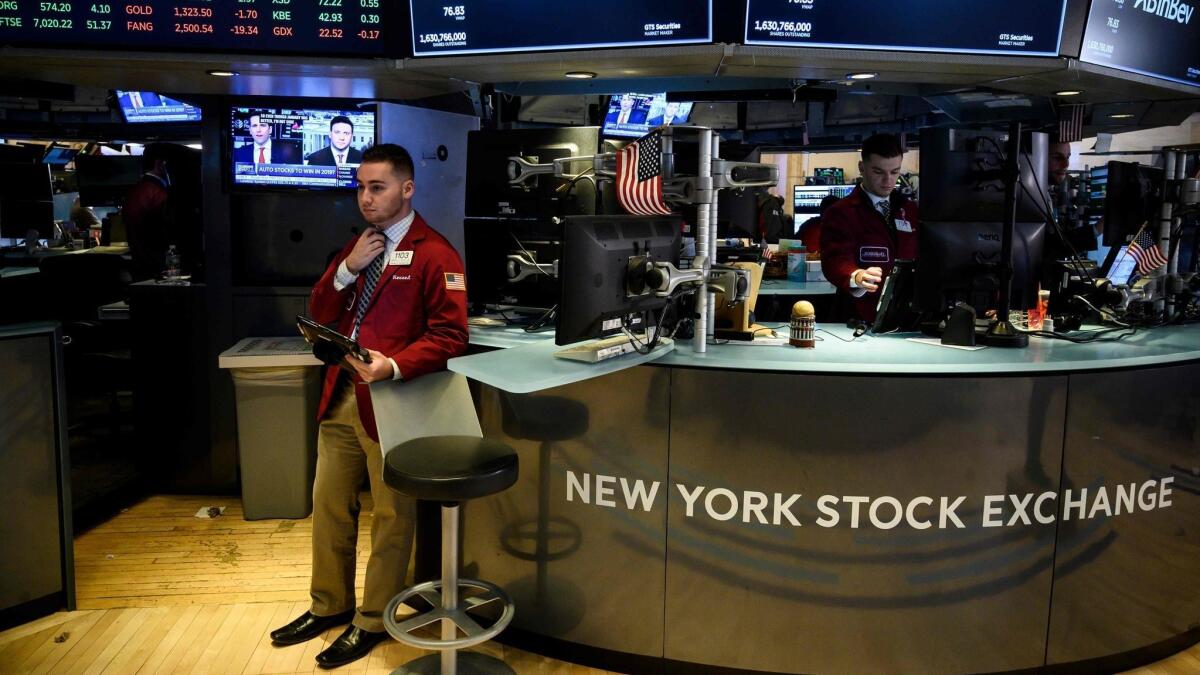Stocks end a bumpy day with small gains, capping a solid week

- Share via
U.S. stocks capped a bumpy day of trading Friday with slight gains, extending the market’s winning streak to its third straight day.
Gains by technology companies, energy firms and banks outweighed losses by retailers and other kinds of companies.
Major indexes were higher much of the morning as investors applauded a burst of hiring in January by U.S. employers. That enthusiasm was tempered, however, by a disappointing revenue outlook from Amazon.
The solid jobs report came two days after investors got encouraging news from the Federal Reserve, which confirmed that it will be “patient” in deciding when to raise interest rates.
That policy shift, which the Fed signaled early last month, helped spur a turnaround in the market that led to January closing out with the biggest monthly gain since 2015.
That strong finish to the month, in addition to the latest jobs report, may have given some investors reason to take a breather Friday. The market barely squeaked out a gain.
“There’s going to be a vacuum of positive catalysts next week, with the exception of a few individual earnings reports,” said Randy Frederick, vice president of trading and derivatives at Charles Schwab. “With this type of a rally behind us, it just looks to me like we’re running out of a little bit of steam here in the near term.”
The Standard & Poor’s 500 index edged up 2.43 points, or 0.1%, to 2,706.53. The Dow Jones industrial average rose 64.22 points, or 0.3%, to 25,063.89.
The Nasdaq composite slipped 17.87 points, or 0.2%, to 7,263.87. The Russell 2000 index of smaller companies ticked up 2.64 points, or 0.2%, to 1,502.05.
Despite the strong U.S. jobs report, investors are seeing signs of weakness elsewhere in the global economy. Inflation among the 19 countries that use the euro eased in January, a sign of weakness in a region already beset by challenges. Italy is in a recession, and Britain appears to be headed for a disorderly exit from the European Union.
In the United States, consumer confidence fell in January for a third straight month. The housing market is slumping as mortgage rates steadily rise. Sales of existing homes plunged in December and fell 3.1% in 2018.
The protracted trade war between the United States and its trading partners continues to be a significant worry for investors. On Friday, the European Union introduced new measures to prevent steel produced for the U.S. market from flooding into Europe.
Two days of U.S.-China trade talks wrapped up Thursday without a deal but with an upbeat outlook. Meanwhile, investors are worried about a slowdown in China’s economy and the damage the tariffs could cause to the U.S. economy by raising prices on consumer products.
Amazon’s latest outlook disappointed investors and weighed on the broader retail sector Friday. The e-commerce giant cashed in on a strong holiday shopping season, and its quarterly earnings topped $3 billion for the first time. Both profit and revenue beat Wall Street forecasts, but the results couldn’t outweigh disappointment over the company’s outlook. The stock fell 5.4% to $1,626.23.
Other big retailers also lost ground. Kohl’s slid 2.9% to $66.69, and Target fell 2.5% to $71.17.
Exxon climbed 3.6% to $75.92 and Chevron gained 3.2% to $118.37 after both companies beat forecasts despite a highly volatile period for oil prices. The price of benchmark U.S. crude fell about 40% during the final quarter of 2018. That sharp drop followed a year of price gains. For Exxon, it was the most profitable year since 2014.
Benchmark U.S. crude rose 2.7% to $55.26 a barrel in New York. Brent crude, used to price international oils, rose 3.1% to $62.75 a barrel in London.
In other energy futures trading, wholesale gasoline climbed 4.3% to $1.44 a gallon. Heating oil rose 1.9% to $1.91 a gallon. Natural gas slid 2.8% to $2.73 per 1,000 cubic feet.
Bond prices fell. The yield on the 10-year Treasury rose to 2.69% from 2.63%.
More to Read
Inside the business of entertainment
The Wide Shot brings you news, analysis and insights on everything from streaming wars to production — and what it all means for the future.
You may occasionally receive promotional content from the Los Angeles Times.










